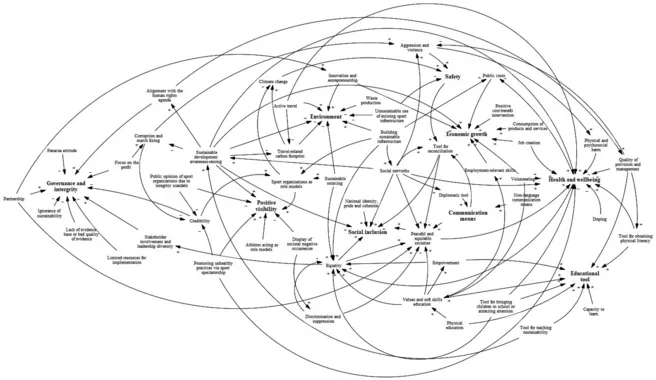Background
Achieving the sustainability goals is in acute danger - sport also has a responsibility here. The aim of the study is to reveal the collective viewpoints of relevant actors through systems thinking to reveal the comprehensive role of sport in sustainable development. Using an interpretive approach, it examines how experts in the field understand the interaction of sport with sustainable development. The interrelationships of the identified categories in popular and elite sports should be depicted.
Design and results
The first author conducted 29 semi-structured interviews with senior management decision makers in international sports organizations and used an inductive approach to analyze the data and the system map and demonstrate the various interrelationships of the identified categories. The system map offers a visualization of perceived causal relationships that come directly from the interviews with the experts. The map contains 58 variables, including nine themes and 49 categories, connected via 112 causal relationships, indicating the interconnected structure. The themes “Environment”, “Social Inclusion”, “Economic Growth” and “Health and Wellbeing” represent outcomes of sport, while “Visibility”, “Security”, “Means of Communication”, “Educational Tools” and “Governance and “Integrity” are Mechanisms of how sport can interact with sustainable development.
Recommendations
The system map provides a tool that promotes understanding of the complexity of the relationships between important variables. The results highlight partnerships as drivers of innovation and entrepreneurship. This is not just about technological innovations, but also about new governance solutions that promote peaceful and just societies through sport. Stakeholder trust proved to be both important and problematic: important because stakeholder trust is necessary for public acceptance of sustainable innovations, and problematic because good governance is often lacking in sports organizations. The lack of transparency can negatively impact public perception and trust in sports organizations and, at the same time, their potential to act as role models for sustainability. Furthermore, a low level of evidence in research (i.e. high risk of bias) is considered a barrier to assessing the impact of sport on sustainable development.
Contact
Chair of Sport and Health Management
Prof. Dr. Jörg Königstorfer
Sekretariat: Mirjam Merz
Uptown München Campus D
Georg-Brauchle-Ring 60/62
80992 Munich
Phone +49.89.289.24559
Fax +49.89.289.24642
info.mgt@sg.tum.de
